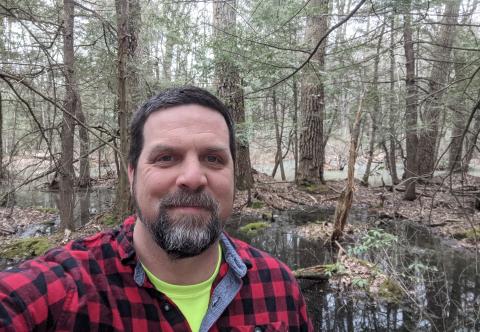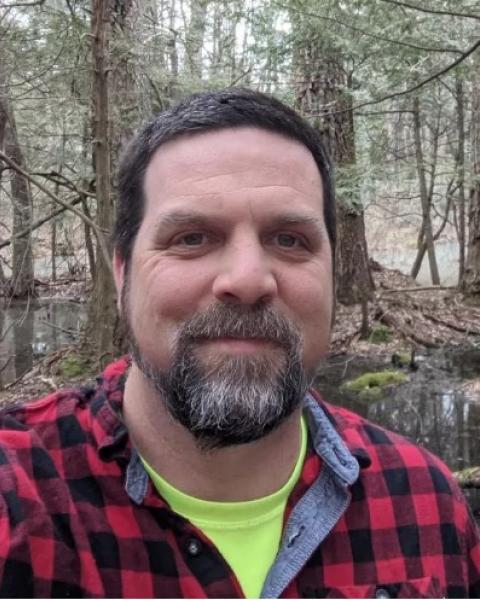In the Woods with Mike Gagnon, Hillsborough County Forester

Extension county foresters help citizens and landowners learn about and care for New Hampshire's forests, trees, wildlife and habitats. Because they're usually in the woods, getting to know your county forester can be a challenge. That's why we've created In the Woods, an ongoing series of interviews with Extension foresters. Get to know your county forester and then give them a call to join you on a walk in the woods.
Name: Mike Gagnon
Title: Hillsborough County Forester, Natural Resources Field Specialist
Start Date at Extension: December 2019
Interested in walking your woodlot with Mike? You can contact him at michael.gagnon@unh.edu or (603) 641-6060.
What brought you to Extension?
The opportunity to share my background and enthusiasm for forestry and natural resources stewardship in a meaningful way that makes a real difference for the people and the natural resources of New Hampshire!
How would your 10-year old self react to what you do?
My 10-year-old-self wanted to be a Disney animator, but I think it's very cool that I made a career based around an activity that my 10-year-old-self simply called exploring. Back then, exploring was the catch-all term for just spending time outdoors, observing, and enjoying the natural world. Similarly, being a forester entails a lot of careful observation in the woods, albeit with a bit more purpose. However, there is always that sense of exploration and excitement about what you might encounter around the next bend while out in the woods.
What originally got you interested in your current field of work?
I always had a strong interest in ecology and the natural world in my youth, but what really made me decide to pursue a career in forestry came later in life after graduating high school. One spring, I spent a week camping along the Appalachian Mountains with two friends who were students in the Thompson School Forest Technology program at UNH. We explored the Blue Ridge Mountains in Virginia, the Great Smoky Mountains in Tennessee, and ended up in the Joyce Kilmer Slickrock Memorial Forest in North Carolina. The Joyce Kilmer Forest is an incredible old growth Appalachian Forest with towering tulip poplars, and giant ancient beech and hemlock trees. I have wanted to go back there ever since that first trip. I spent that whole week in the woods listening to these two forestry students talk about all the things they were learning, and I was sold. I was enrolled in the UNH Forest Technology program that September.
Who is a forester who you look up to or who has inspired you?
There are so many past instructors, advisors, and colleagues that have influenced and helped me along the way, it is difficult to pick just one. Recently, Tim Fleury (Merrimack County Forester), my mentor and colleague at Extension has been a tremendous influence on my growth in this role as an Extension field specialist. Tim has helped me to really understand Extension work and how to be an effective county forester. Tim really embodies what an Extension agent should be, more than just a person with expertise and information to share, but also a part of the fabric of the communities he works in, and I really admire that.
What energizes you and brings you excitement?
I constantly get excited and energized by all the landowners I get to meet on a regular basis. There are so many good people around the state acting as good stewards of their land. I feel privileged that I get invited to people’s homes and I get to learn about them and their history with their land, which may be brief or span generations.
Which NH tree species is the most underrated or has a bad reputation?
Silver Maples often get a bad rap, largely because they were historically incorrectly planted as street trees where they really don’t belong. Planting of silver maples was very common following World War II, to replace American elms lost to Dutch elm disease. The reason for planting them as street trees in the past was because they are fast growing and tolerate a variety of conditions. The problem is they are a species of soft maple, opposed to hard maple like sugar maple. Soft maples respond to injury poorly, and silvers are notoriously weak wooded and have a naturally wide spreading structure. This makes them susceptible to wind, snow, and ice damage, which is a real problem for a street tree when they start getting large—and boy do silver maples get large! In their natural habitat as a floodplain species, they are perfectly adapted to re-sprout when they break, arch out over the river, and disperse their seeds along a waterway. A floodplain forest is a unique and fascinating habitat to spend time in, filled with other unique species that reflect the nutrient rich environment.
If there was one thing you would want landowners to know, what would it be?
In New Hampshire, 68% of our forested lands are owned by private landowners like you and me. This means the fate of New Hampshire’s forests lies collectively in the management and care that landowners place on their woodlots. Therefore, the sum of all the smaller decisions folks make to care for their woodlot makes a big difference when you add them all up.
What's one work-related thing you want to accomplish in the next year?
In the next year I would like to continue getting back to more in-person programming in larger groups. We were lucky to be able to continue working safely through COVID, through Zoom and in very small outdoor group settings. Recently, it has been really refreshing to be able to meet safely in larger groups. I think many of us miss that sense of community and I am glad to see it returning.
What’s the the coolest or most memorable moment you've had in the woods?
I am a big enthusiast for reptiles and amphibians. This means you will find me out in the woods at night in late March, when it is about 42 degrees and raining, trying to catch the first signs of spring when salamanders and amphibians emerge to migrate to their vernal pools to breed. This year, I was able to hit the spring amphibian migration known as the “big night” and I saw at least 100 spotted salamanders in about an hour. I also got to observe their courtship ritual where dozens and dozens of them congregate in one spot in the pool and do a kind of dance called a Liebesspiel. Catching the big night of amphibians emerging in spring never ceases to amaze me!
What are you looking forward to in the coming months?
Spring is really picking up right now, and I am looking forward to another busy season out in the woods with landowners in Hillsborough County.
What’s your favorite way to spend a weekend?
At home with my family, working on projects around the house, or going out hiking in the woods with my wife and two kids.
If you suddenly became a master at woodworking, what would you make?
I would build an elaborate display for all my vintage Star Wars toys. Yes, I am a grown man who collects toys!
If you had to describe yourself as a forest animal, which one would it be?
I would describe myself as a barred owl. Not because I think I’m so wise, a trait we often attribute to owls, but because I like to move stealthily through the woods and quietly and carefully observe my surroundings. Owls are also introverts, right? I also like to cook, and the barred owl says, “Who cooks for you, who cooks for you all.”
What's your favorite ice cream flavor?
I have always liked coffee ice cream and then I discovered the ice cream shop near my home has coffee-Oreo, and that is my new favorite!
What was the last book you read or movie you saw?
I recently saw the new movie Dune and I was really blown away by how good it was. I guess I should read the book because it is probably even better!
Which meal is your favorite: breakfast, lunch, or dinner? And what is that dish?
Definitely breakfast, and breakfast for dinner is even better! I love all the classic breakfast stuff and of course French toast or pancakes with real New Hampshire maple syrup!
Where is the most interesting place you’ve been?
I was fortunate enough to spend a good deal of time working in the jungle in the Yucatan Peninsula in Mexico. During part of this time, I also had the opportunity to stay in a modern Mayan village. The people and the dry jungle ecosystem there are really fascinating, all living on an ancient coral reef with rivers flowing underground! The sound, or symphony rather, of waking up in a jungle in the morning was unforgettable. Also, the food was amazing!
What’s something you like to do the old-fashioned way?
I really enjoy sharpening my chainsaw by hand. When the saw hits a piece of wood, and you know its sharp the very instant it starts cutting is a gratifying feeling of a job well done.

